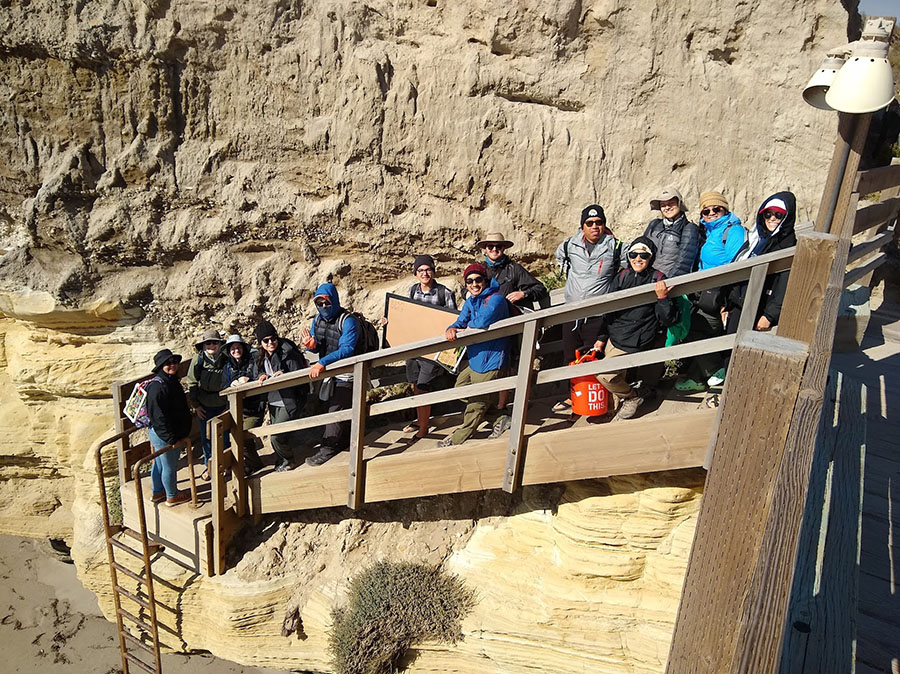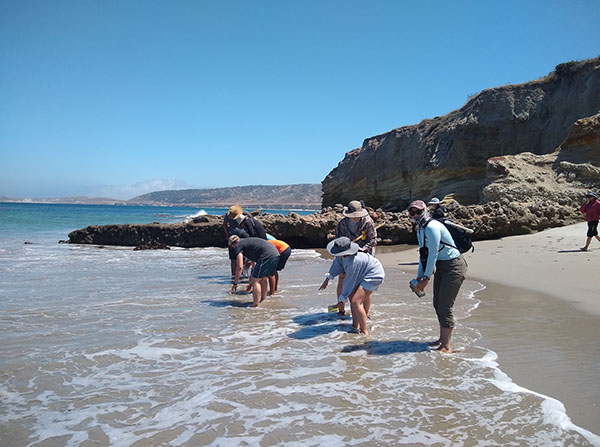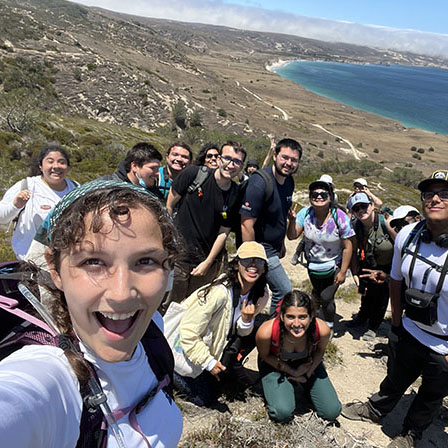CAMARILLO — Fourteen CSU Channel Islands (CSUCI) students sat around a conference table in the John Spoor Broome Library as photos they had taken on Santa Rosa Island lit up the screen at the front of the room.
One photo was taken by Environmental Science & Resource Management (ESRM) major Renee Giragosian as she rode an Island Packers boat into a yawning cave.
“This is the most present I’ve ever felt,” she said, recalling the moment. “It was the fact that this cave was right off the coast as we were just concluding this one month long amazing, challenging journey.”
 In June, the 14 ESRM students participated in a unique interdisciplinary Field Studies program that gives upper division students a chance to spend weeks on Santa Rosa Island. Then in July, 18 Biology students participated in a separate inaugural Field Ecology program on the island. Students in both programs lived on the island while learning about the environment, wildlife, cultural history, and many other aspects of the island from a variety of experts.
In June, the 14 ESRM students participated in a unique interdisciplinary Field Studies program that gives upper division students a chance to spend weeks on Santa Rosa Island. Then in July, 18 Biology students participated in a separate inaugural Field Ecology program on the island. Students in both programs lived on the island while learning about the environment, wildlife, cultural history, and many other aspects of the island from a variety of experts.
 “They went for 24 days straight,” said Assistant Professor of ESRM Dan Reineman, Ph.D., who helped lead the June ESRM group. “These were long, hard days. We would meet at 7:30 or 8 a.m. and be in the field all day working through a full curriculum. And after that, someone would have to cook for the group, others would have to clean, and then we might try to squeeze in a lecture after dinner.”
“They went for 24 days straight,” said Assistant Professor of ESRM Dan Reineman, Ph.D., who helped lead the June ESRM group. “These were long, hard days. We would meet at 7:30 or 8 a.m. and be in the field all day working through a full curriculum. And after that, someone would have to cook for the group, others would have to clean, and then we might try to squeeze in a lecture after dinner.”
Viviana Celaya shared a photo she took while from Carrington Point, collecting data on the nearby sea lion colony. Nearby was an ocean blowhole, a sea arch and colorful island paintbrush.
“We were so lucky to be there enjoying the ocean and the seals and sea lions,” she said. “Just seeing how many sea lions would show up, and I saw a seal pup!”
Students and faculty stayed at the Santa Rosa Island Research Station (SRIRS), a historic ranch house with an eight bedroom, 22-bed bunkhouse, tent cabins, a kitchen, dining room, a manager’s quarters and a research facility. Coordinated by SRIRS Director Russell Bradley, the station promotes research, restoration, and education through a partnership with the Channel Islands National Park.
“Students led group research projects and took extended hikes to study island lagoons and even a sunset hike up to Black Mountain and back down at night,” Bradley said. “A wilderness first aid course was part of the program and lots of Type I and Type II fun.”
Type I Fun, Reineman explained, is fun you know you are having in the moment and Type II Fun—common in field research—is fun you aren’t sure you are having in the moment, “but afterwards realize was awesome,” he said.
In late June, after their return, the Field Studies faculty and students gathered for a Final Award Ceremony in Broome Library, in which they shared memories, reflections and research results.
“This is an island fox,” ESRM major Meghan Branson said about her photo. “They live on this island alone all their lives. And we got to spend an entire month on this island with little to no connection with the mainland. We’ve gone through a lot of growth, just like the island fox has.”
Bradley was the power behind the Field Studies project as he and the SRIRS staff have been laying the groundwork for the field studies program for years with Reineman and Executive Director of Regional Educational Partnerships Jenn Perry, Ph.D., also an anthropologist.
“I think of all the years I’ve participated in intensive field programs—knowing the potential of the transformative power of these experiences—to be able to hear and see the students understand that and internalize that is amazing,” Perry said.
Bradley also worked with Associate Professors of Biology Geoff Dilly, Ph.D. and Allison Alvarado, Ph.D. as well as Assistant Professor of Biology Rudi von May, Ph.D. on the biology-focused Field Studies class that took place in July. All of the organizers were inspired by field studies programs they have attended and led in the past.
“It’s one of the main reasons I pursued a career in science,” Bradley said. “These sorts of immersive field experiences are a ‘next level’ extension of our programs at the research station. We want to create opportunities many of our students wouldn’t have thought were possible.”
None of it would have been possible were it not for a gift from Judith and Jack Stapelmann, Santa Barbara philanthropists well-known for their generous support for education about the natural world.
The Field Studies session in July led by Dilly, Alvarado, and von May enabled 18 Biology students to spend 10 days on the island.
“Nothing in a book can replicate going out and digging in the sand, or holding something in your hand,” Dilly said. “Or going out and looking for bats.”
The students were split into groups of five with each group conducting one marine and one terrestrial project. For example, Senior Biology major Colby Klainan studied island frogs and Junior Biology major Bridgette Bagheri studied how well kelp sustains various island species.
“We learned more from a week and a half on this island than we would have from a 15-week class,” Klainan said.
“Home is where the heart is and a piece of my heart is always going to be on that island,” Bagheri said
About California State University Channel Islands — CSU Channel Islands (CSUCI) is reimagining higher education for a new generation and era. We are an innovative higher education institution that enables students to succeed and thrive – serving as an engine for social and economic vitality that provides the intellectual resources necessary for a thriving democracy. With more than 7,000 students, 1,200 employees and 22,000 alumni, CSUCI is poised to grow in size and distinction, while maintaining one of the most student-focused learning environments in public higher education. Connect with and learn more by visiting www.csuci.edu or CSUCI’s Social Media.
The University encourages persons with disabilities to participate in its programs, events and activities. If you anticipate needing any type of accommodation, or have questions about the physical access provided, please contact the respective area below as soon as possible, but no later than seven (7) business days prior to the event/activity:
CSUCI Students
Disability Accommodations & Support Services: accommodations@csuci.edu
CSUCI Employees
Human Resources: angela.portillo@csuci.edu
Members of the Public
Title IX & Inclusion: titleix@csuci.edu

